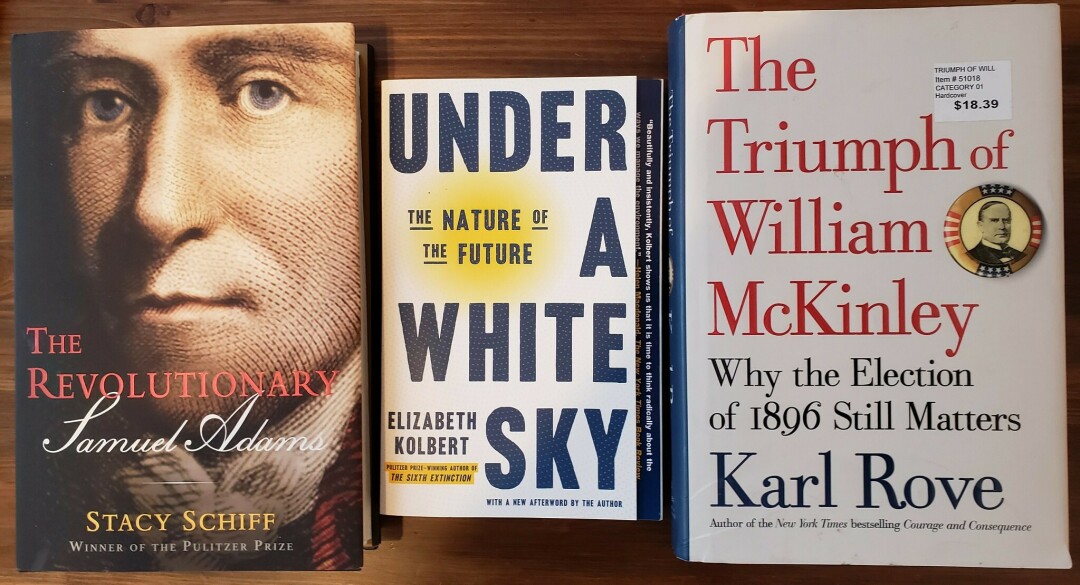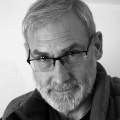Three books

It’s a good year when I read 10 books – histories mostly. Much to my wife’s chagrin I buy real ones to stain with yellow markers rather than the digital kind that disappear into one’s pocket or purse.
Mine have accumulated steadily on a dozen book shelves in our house. The unfinished books vie for my attention with book marks left between their pages. They remind me where I left off when I turned my attention elsewhere. They aren’t “finished” until I reach the index.
Perhaps a quarter of my books fit that category.
After a book-deprived summer campaigning for Congress I dived into six books from September to New Year.
I began with George Washington exploring America to inaugurate his first year as President, during which time he signed an Indian treaty.
Nat Philbrick’s Travels with George was followed by four books on different periods of land theft. The War of 1812, The Trail of Tears, the Sioux Uprising and the Comanche Wars.
Then I read a novel to my Claudia. The Oppermans was written in the months after Hitler became Germany’s Chancellor in 1933. Its depiction of the horrors inflicted on German Jews five years before the Second World War was glowingly reviewed in the New York Times.
It answered the question I asked myself as a child; Why didn’t the Jews stand up for themselves? A good book can explain a lot.
I hope to keep up this, for me, torrid reading pace in 2023. Pictured are three recent acquisitions – Stacy Schiff‘s The Revolutionary Samuel Adams, Elizabeth Kolbert’s Under a White Sky and Karl Rove’s “The Triumph of William McKinley: Why the Election of 1896 Still Matters.”
I expect some damn good answers from all of them. I’ll tell you a bit about them so you can guess which will be my first “finished” book of the year.
The shortest at 212 pages is Under a White Sky by Elizabeth Kolbert. I bought it for my son last Christmas then decided I should have one too. It’s author won a Pulitzer for The Sixth Extinction.
Its thesis is the same as my Nov 10, 2022, column “We are the Meteor.” Humans are about to kill the dinosaurs a second time. White Sky offers some ideas on how we can save a little of God’s Ark. My bookmark rests between pages 28-29. I owe it to my grandchildren to finish.
I acquired Karl Rove’s political history in 2017. It has a memorial blood bank card stuck between pages 96-97. The Triumph is 383 pages before the Index. Rove’s thesis is the book’s subtitle: Why the Election of 1896 Still Matters.
I suspect Rove, who has raised billions for Republicans, considers himself an heir to the plutocrat Mark Hanna, who fought off William Jennings Bryan’s socialism to preserve the Gilded Age.
If so, William McKinley was to Hanna what George W. Bush was to Rove. Triumph was published in 2015, the year Donald Trump jumped into Rove’s big money GOP primaries and smashed their empty candidates to smithereens.
Money rules in Rove’s world, and is explained in Jane Mayer’s book Dark Money. I have a Moose Lodge bookmark stuck between pages 226-227.
Republican Teddy Roosevelt provided the antidote to Gilded Age corruption. He passed laws severely restricting corporate political contributions. A new Republicanized Supreme Court overturned them in Citizen’s United.
Before I bookmarked Rove’s book I was struck with an anecdote extolling William McKinley as a man of principle. Rove explains that Bill once had a chance to crush an opponent by exposing some dirty deed but Bill wouldn’t stoop to such a level just to win an election.
I found it odd that Karl Rove would praise such virtue, considering what George W. Bush’s presidential campaign did to Senator John McCain in South Carolina. The day before that state’s primary robo-calls informed every Republican voter that candidate McCain had fathered a black child. There is little doubt insider Rove knew about this vile tactic in advance. He could have insisted on a McKinley moment, but no, Rove’s methods brought us Jan. 6. His politics are closer to The Oppermans.
Finally there is Stacy Schiff’s book about Samuel Adams. Among Sam’s revolutionary peers he was considered the most important patriot. To historians he is a mystery because he destroyed the archival evidence of his role in the Revolution.
He had good cause for secrecy. Had the British discovered his correspondence many signers of the Declaration of Independence would have swung from trees.
The book showed up Christmas morning after I mentioned a laudatory review in the New York Times. I didn’t realize it then but two of Pulitzer-winner Schiff’s histories are already gathering dust on our book shelves. They are Cleopatra: A Life (with a bookmark) and The Witches.
Since Jan. 6 revealed the fragility of our Democracy I have good cause to study the patriots who brought it to life. And Sam Adams is of particular interest to me for another reason. He was also the subject of my grandfather Robb’s master’s thesis in 1915 at Columbia University
Welty also shoots his mouth off at: Lincolndemocrat.com
